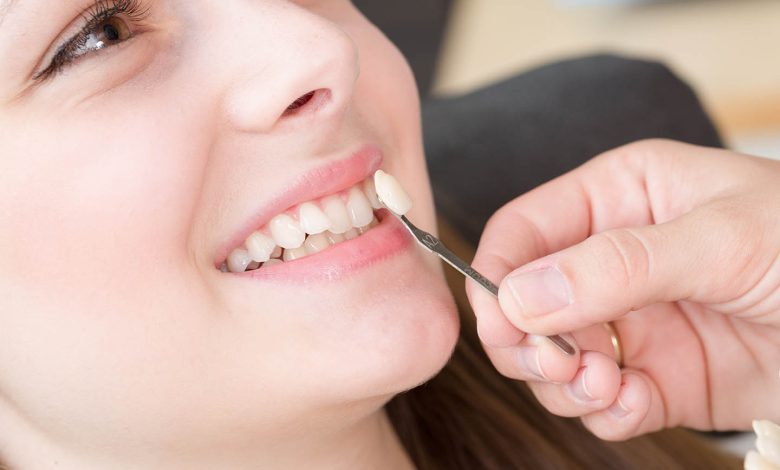What is a dental veneer?

A dental veneer is a thin layer of material placed on a tooth’s surface to improve its appearance. It can be made from porcelain, composite resin or other materials. Veneers are used to correct discoloration, chips and cracks in teeth, fill the gaps between teeth and make them straighter. They are also used to correct minor misalignments of the teeth.
Dental veneer teeth shaving is very thin shells placed on the visible face of the teeth to correct their aesthetics. As much the color and shape of the positioning of the teeth can be improved thanks to this technique of cosmetic dentistry.
But what makes this tailor-made dental treatment such an attractive solution?
Discover all the benefits of dental veneers to beautify your smiles daily.
What are dental veneers used for?
Dental veneers can treat all kinds of aesthetic problems. It is ideal for magnifying your teeth painlessly, quickly, naturally and discreetly.
Designed according to your morphology and your aesthetic objectives, dental veneers are a winning choice for:
- Align your teeth;
- Whiten your teeth;
- Change the shape of your teeth;
- Replace dental crowns;
- Hide the spaces between your teeth (diastemas).
No more long, complex and restrictive dental treatments; dental veneers adjust to you and never the other way around!
And the contraindications?
Although dental veneers are an option for many pat certain contraindications expectations, the dentist can assess you and determine if you are a candidate for this type of treatment.
Thus, this type of dental shell is generally to be avoided if:
- You suffer from bruxism (uncontrolled grinding and teeth clenching during sleep).
- You have certain periodontal diseases, such as gingivitis or periodontitis.
- Your teeth are too damaged (at this time, crowns become necessary).
- You lack enamel on your teeth.
However, as each case is unique, consider consulting a dentist to benefit from treatment adapted to your situation.
What are the different types of dental veneers?
Dental veneers are available in 2 different forms, depending on your needs: composite dental veneer and ceramic/porcelain dental veneer.
Let’s see what distinguishes these 2 types of facets.
Composite dental veneers (white filling)This type is a more conservative treatment, generally used to correct small aesthetic problems, such as a broken or too short tooth.
For this treatment, the dentist puts on your teeth what is called a composite resin, a biocompatible material available in several shades of white. The dentist generally opts for the composite veneer to correct small spaces between the teeth, especially in the molars and premolars.
Installed in a single session, the composite veneers are reversible and removable. They do not require any dental impression or design in a specialized laboratory. In short, this white filling is the ideal choice to solve minor dental problems quickly and simply.
However, this treatment is less durable than the ceramic model. Its lifespan is about 5 years, and good oral habits are essential!
-
Ceramic/porcelain dental veneers
For more complex cases, ceramic or porcelain veneer becomes the obvious option. Made in a specialized laboratory, this type of translucent and smooth dental veneer is installed in 2 sessions: an appointment to take your impressions and fully evaluate your teeth and another to install the veneers.
Unlike white fillings, ceramic or porcelain veneers are more durable (about 15 years lifespan) and more natural looking. In addition, they do not stain and will never change color. In this sense, it is an excellent substitute for teeth whitening.
However, these dental veneers are less aesthetic, which explains why they are generally installed on the hidden face of the teeth. It is also a more expensive option than white filling.
How is the installation of dental veneers carried out?
You will understand that the installation process varies for composite, ceramic, or porcelain veneers.
In the case of composite models:
- The dentist uses a chemical substance, which he applies to your teeth to increase the adhesion of the resin.
- He then gradually adds several resin layers to the tooth, letting us harden.
- Finally, in the same appointment, he polishes and models the resin to guarantee you a natural and highly aesthetic result.
As for the ceramic or porcelain veneer, the process takes place over a longer period:
- In a first appointment, the dentist removes some enamel from the teeth (if needed). This first step is performed under local anesthesia.
- During this same appointment, he takes an impression of your teeth.
- Sometimes, temporary veneers are in the teeth while waiting for installation.
- The facet is made in the laboratory according to your dental impressions, morphology, and teeth color or shape.
- During a second appointment, this custom-made and permanent dental veneer is installed on your teeth using a composite cement specially designed for dentistry.
How to take good care of your dental veneers?
Although no specific maintenance is required for your dental veneers, you should still keep these important practices in mind:
- In the first days, avoid foods that are too cold, too hot or too hard: your veneers can be damaged prematurely if you eat foods that are too high or too low. Ditto for foods that are too hard and can wear down your facets.
- Avoid products that stain your teeth: in the same vein, during the period of adaptation to your permanent veneers, you should also avoid consuming products that can stain your teeth. Let us think here of coffee, tobacco, wine or soft drinks.
- Adapt your toothbrushing technique: your oral hygiene is essential to optimize the good results of your dental veneer. To do this, brushing your teeth 3 times a day is important. However, make sure not to put pressure on your teeth when brushing. And floss well!
- Consult a dentist regularly: your dental veneers must be scaled at least once every 6 months. The dentist will be able to carry out this scaling without affecting the effectiveness of your treatment.
Attention:
So, paying attention to your teeth is the only maintenance needed for dental veneers. So, if you already have good oral hygiene, you won’t have to change your habits.
By being careful, you maximize the life of your veneers and reduce the number of necessary visits to the dentist. Result: dental veneers that last 10, even 20 years!
Go ahead, smile a thousand lights!
Do you tend to avoid a toothy smile? Does the aesthetics of your teeth affect your appearance? Want to avoid crowns? Then dental veneers are probably for you!
Perfectly recreating the natural appearance of your teeth, dental veneers are a method that combines the best of both worlds: that simplicity and effectiveness.
To read more articles click here.




